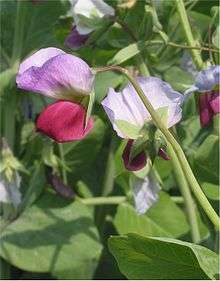Field pea
The field pea is a type of pea of the species Pisum sativum, sometimes called P. sativum subsp. arvense (L.) Asch. Also known as dun (grey-brown) pea, Kapucijner pea, or Austrian winter pea, field peas are one of the oldest domesticated crops, cultivated for at least 7,000 years. They are now grown in many countries for both human consumption and stockfeed. There are several cultivars and colors including blue, dun (brown), maple and white. The field pea should not be confused with the Cowpea (Vigna unguiculata) which is sometimes called the "field pea" in warmer climates.[1][2]


Description
It is closely related to the garden pea, whose immature pods and seeds are used throughout the world as green vegetables. It is a climbing annual legume with weak, viny, and relatively succulent stems. Vines often are 4 to 5 feet long, but when grown alone, field pea’s weak stems prevent it from growing more than 1.5 to 2 feet tall. Leaves have two leaflets and a tendril. Flowers are white, pink, or purple. Pods carry seeds that are large (4,000 seeds/lb), nearly spherical, and white, gray, green, or brown. The root system is relatively shallow and small, but well nodulated.[3]
History
Field pea has been an important grain legume crop for millennia, seeds showing domesticated characteristics dating from at least 7000 years ago have been found in archaeological sites around what is now Turkey.
Production
Field pea is a cool-season legume crop that is grown on over 25 million acres worldwide. Field pea or “dry pea” is marketed as a dry, shelled product for either human or livestock food. Field pea differs from fresh or succulent pea, which is marketed as a fresh or canned vegetable. The major producing countries of field pea are Russia and China, followed by Canada, Europe, Australia and the United States. Europe, Australia, Canada and the United States raise over 4.5 million acres and are major exporters of peas. In 2002, there were approximately 300,000 acres of field peas grown in the United States.[4]
References
- ↑ "Field pea, (Pisum sativum)". Pulse Australia.
- ↑ French, Bob. "Crop management Growing field pea" (PDF). Australia, Dept. of Agriculture and Food.
- ↑ Sattell, R. "Field Pea" (PDF). Oregon State U.
- ↑ McKay, Kent. "Field Pea Production" (PDF). North Dakota State University.